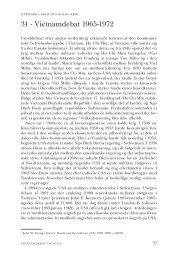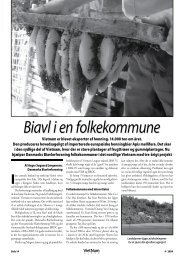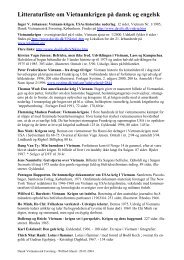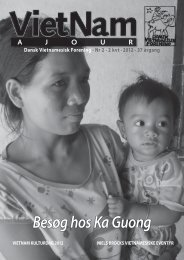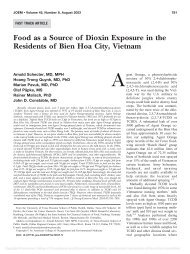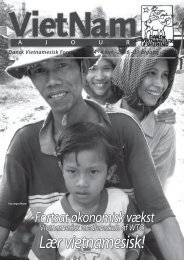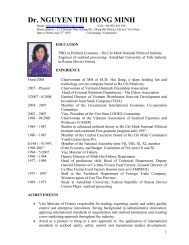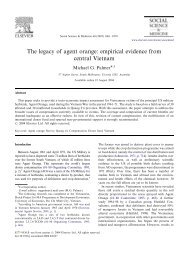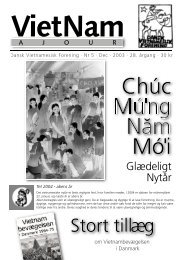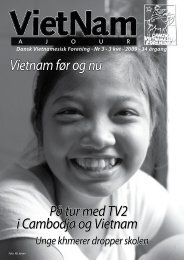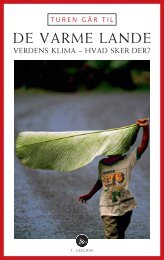Ford Foundation Special Initiative on Agent Orange/Dioxin
Ford Foundation Special Initiative on Agent Orange/Dioxin
Ford Foundation Special Initiative on Agent Orange/Dioxin
Create successful ePaper yourself
Turn your PDF publications into a flip-book with our unique Google optimized e-Paper software.
The foundati<strong>on</strong> supports eight Vietnamese scientists to present their research findings <strong>on</strong><br />
<strong>Agent</strong> <strong>Orange</strong>/dioxin in papers accepted by the 26 th Internati<strong>on</strong>al Symposium <strong>on</strong> Halogenated<br />
Persistent Organic Pollutants in Oslo, Norway, in August. At the symposium, Charles Bailey and<br />
Ngo Thi Le Mai bring together American and Vietnamese scientists and officials, leading to<br />
agreement <strong>on</strong> how to move forward with c<strong>on</strong>tainment of dioxin in Da Nang.<br />
The foundati<strong>on</strong> then provides funding to Committee 33 in September to assess the dioxin<br />
status of Da Nang airport, identify the pathways through which dioxin moves into the<br />
surrounding communities and design c<strong>on</strong>tainment structures ($462,800). Committee 33<br />
engages Hatfield C<strong>on</strong>sultants and BEM Systems of Chatham, N.J., to assist with the work.<br />
Also in September, a grant is awarded to the Vietnam Public Health Associati<strong>on</strong> ($175,000) for<br />
a public health survey around another major dioxin hot spot in Bien Hoa and to develop<br />
protective measures.<br />
On Nov. 13, <strong>on</strong> the eve of President Bush’s visit to Vietnam, the Washingt<strong>on</strong> Post publishes a<br />
fr<strong>on</strong>t-page story <strong>on</strong> the <strong>Agent</strong> <strong>Orange</strong> issue that highlights the work of the foundati<strong>on</strong> and its<br />
partners. (Anth<strong>on</strong>y Faiola, “In Vietnam, Old Foes Take Aim at War’s Toxic Legacy,”<br />
Washingt<strong>on</strong> Post, Nov. 12, 2006, p. 1). Two videos accompany the article <strong>on</strong> the Washingt<strong>on</strong><br />
Post website. The foundati<strong>on</strong> simultaneously holds a news c<strong>on</strong>ference in Hanoi (“<str<strong>on</strong>g>Ford</str<strong>on</strong>g><br />
<str<strong>on</strong>g>Foundati<strong>on</strong></str<strong>on</strong>g> Announces Important Series of Grants <strong>on</strong> Envir<strong>on</strong>mental Research and Public<br />
Health in Vietnam”).<br />
At the c<strong>on</strong>clusi<strong>on</strong> of President Bush’s November visit, he and President Triet issue a joint<br />
statement that for the first time officially acknowledges the dioxin issue and outlines an<br />
approach: “… President Triet also expressed appreciati<strong>on</strong> for the U.S. government’s increasing<br />
development assistance to Vietnam and urged the U.S. side to increase humanitarian<br />
assistance including through cooperati<strong>on</strong> <strong>on</strong> areas such as unexploded ordinance and<br />
c<strong>on</strong>tinued assistance to Vietnamese with disabilities. The United States and Vietnam also<br />
agreed that further joint efforts to address the envir<strong>on</strong>mental c<strong>on</strong>taminati<strong>on</strong> near former<br />
dioxin storage sites would make a valuable c<strong>on</strong>tributi<strong>on</strong> to the c<strong>on</strong>tinued development of their<br />
bilateral relati<strong>on</strong>ship.”<br />
Tim Rieser, majority clerk of the Senate Appropriati<strong>on</strong>s Committee’s Subcommittee <strong>on</strong> State,<br />
Foreign Operati<strong>on</strong>s and Related Programs, visits Vietnam in December and meets with the<br />
<str<strong>on</strong>g>Ford</str<strong>on</strong>g> <str<strong>on</strong>g>Foundati<strong>on</strong></str<strong>on</strong>g> and other actors. At a Hanoi news c<strong>on</strong>ference, he announces that the United<br />
States has a “shared resp<strong>on</strong>sibility” to address unresolved issues from the war.<br />
On Dec. 12 , Susan V. Berresford, Charles Bailey and Ngo Thi Le Mai meet in Hanoi with Prime<br />
Minister Nguyen Tan Dzung, who speaks about the heavy c<strong>on</strong>sequences of the war, the<br />
milli<strong>on</strong>s of people affected by <strong>Agent</strong> <strong>Orange</strong> and living with disabilities and the many heavily<br />
c<strong>on</strong>taminated areas. He notes that the U.S. government calls for further study of the issue of<br />
the human c<strong>on</strong>sequences. Meanwhile, people living in the sprayed areas c<strong>on</strong>tinue to be<br />
affected.<br />
2007<br />
In February, U.S. Ambassador Michael Marine recognizes the importance of addressing the<br />
<strong>Agent</strong> <strong>Orange</strong> issue as a prelude to full normalizati<strong>on</strong> of relati<strong>on</strong>s between the United States<br />
and Vietnam. He secures a State Department grant and additi<strong>on</strong>al funds from the<br />
Envir<strong>on</strong>mental Protecti<strong>on</strong> Agency (EPA) totaling $400,000 toward the cost of dioxin<br />
remediati<strong>on</strong> at Da Nang. Charles Bailey builds a collaborati<strong>on</strong> am<strong>on</strong>g U.S. Embassy and EPA<br />
officials and Vietnamese agencies, and the foundati<strong>on</strong> supplements the State Department<br />
3



